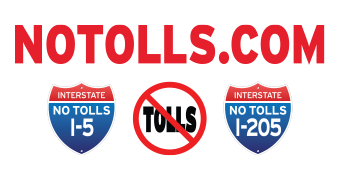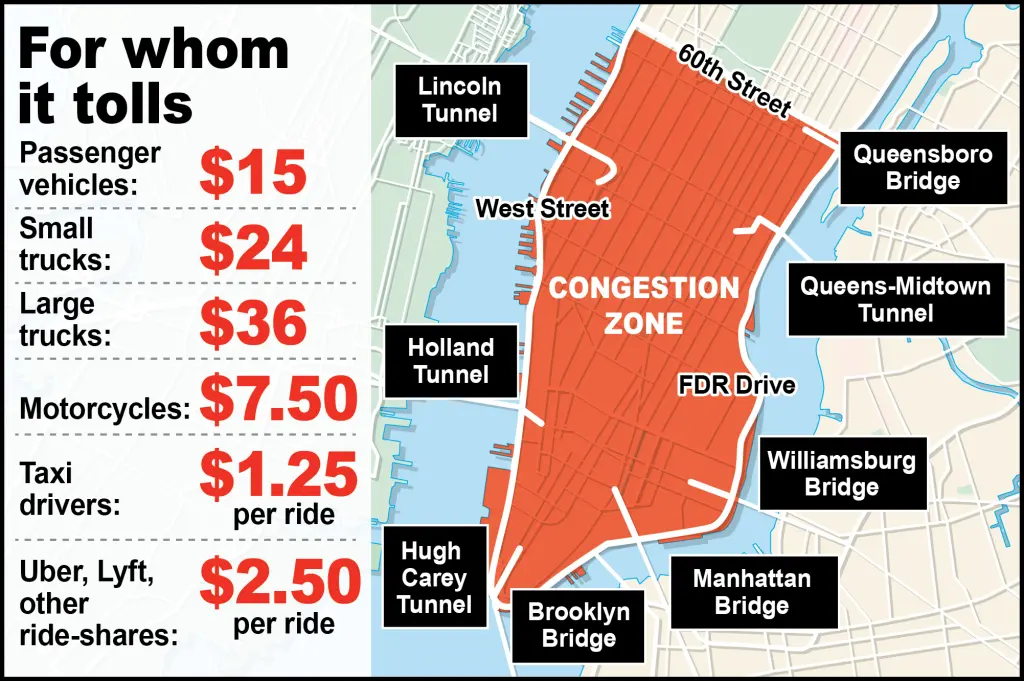First in the nation zone tolling program
Motorists will soon officially be slapped with a back-breaking $15 toll to drive on some of Manhattan’s busiest streets after the MTA’s board voted Wednesday to set New York’s controversial congestion pricing in stone.
The new tolls, likely to launch in June, were approved by an 11-1 vote – despite backlash from critics who’ve slammed the plan as a cash grab that’ll saddle Big Apple drivers with yet another fee.
“Don’t kill the goose that lays the egg,” Nassau County board member David Mack, who was the only person to vote against the pricing plan, told fellow board members Wednesday.
The now formally-approved plan to charge drivers $15 to enter Midtown Manhattan below 60th Street – and an even higher toll for trucks — will include carveouts for private buses and many city-owned cars.
The Wednesday vote essentially rubberstamped the exemptions, as well as the cost, after the MTA board first approved the plan late last year.
Advocates of the plan – the first of its kind in the nation – have long argued the increased tolls will slash peak-day congestion in Manhattan and generate billions for much needed transit and railroad upgrades.
“Funding the infrastructure of the subway, busses, commuter rail, while at the same time reducing congestion for all New Yorkers and helping to clean the air, this is a trifecta we think is critically important,” MTA board member, David Jones, said as he celebrated the approval.
Critics, though, have ripped the toll, saying it could unfairly target some and just end up pushing traffic and pollution out of Gotham and into other areas.
The formal approval came despite a slew of lawsuits still trying to thwart the plan, including from New Jersey Gov. Phil Murphy and many of the Big Apple’s biggest municipal labor unions.
What to know about congestion pricing
- These rates apply during peak hours, 5 am-9 pm weekdays, 9 am – 9 pm weekends. During other times, tolls are lowers to $2.75 for passenger vehicles, $6 for small trucks, $9 for large trucks, and $1.75 for motorcycles. Other rates remain the same.
- Emergency vehicles, school buses, specialized government vehicles and vehicles carrying people with disabilities are exempt.
- Drivers crossing into Manhattan using a tolled tunnel get a $5 discount.
“This is far from over and we will continue to fight this blatant cash grab,” Murphy said in a statement. “The MTA’s actions today are further proof that they are determined to violate the law in order to balance their budget on the backs of New Jersey commuters.
“We will continue to avail ourselves of every option in order to protect residents on this side of the Hudson from an unfair tolling scheme that discriminates against New Jerseyans, especially lower and middle-income drivers.”
Rep. Pat Ryan (D-NY), whose congressional district includes parts of Hudson Valley, accused the MTA of failing people – including many first responders — who live upstate but commute to the city for work.
“This ‘plan’ is completely detached from reality, and it cannot stand,” Ryan said.
“The MTA ignored the voices of countless Hudson Valley residents, firefighters, police officers, union members, and teachers alike, public servants who might live in the Hudson Valley, but protect New York City.”
Meanwhile, City Hall will likely continue to push for an exemption for yellow cabs, a top aide to Mayor Eric Adams, who serves on the board, signaled during the vote.
“We remain concerned about the plight of taxi drivers,” Deputy Mayor Meera Joshi said.
Here’s the breakdown for what each vehicle will be charged for once-a-day toll between 5 a.m. and 9 p.m. on weekdays and 9 a.m. and 9 p.m. on weekends:
- Passenger vehicles: $15
- Small trucks: $24
- Large trucks: $36
- Motorcycles: $7.50
- Taxi drivers: $1.25 per ride
The MTA board was required by a state law passed in 2019 to approve a tolling structure that will generate $1 billion annually to pay for new subway trains, signal overhauls, a new expansion of the system into East Harlem and other major projects.
Experts have said that the ongoing legal challenges face an uphill fight in trying to overturn the conclusions laid bare in a 4,000-page environmental review carried out as part of the congestion plan.
Most of the ongoing cases have been consolidated in both Manhattan and Newark federal courts – with oral arguments set to take place in the Garden State case on April 3.








